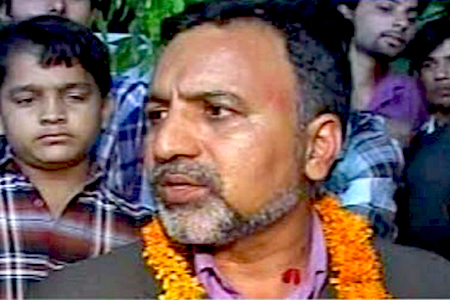New Delhi, October 22: Journalist Syed Mohammad Ahmed Kazmi, who was released on bail after seven months in the Israeli diplomat car attack case on Friday, has claimed that he was framed because he use to regularly make phone calls on Iranian numbers for official purposes. "I was picked up because I use to call Iran every day for journalistic purposes. They needed a scapegoat living in the Lodhi Road area," he said.
Kazmi said that he is sure that the case will not result in conviction and that the "truth will prevail". "Generally bail is given when the court is satisfied that the case will not result in conviction. I am innocent and I will love to hear at the end of the case that I'm free from all charges," said the journalist. "I have definitely been framed. I have been in journalism for the last 30 years. I started with an Iranian news agency in 1983 and therefore it was natural for me to travel to Iran. All allegations are false. They tried to frame me because of outside powers," he added.
He, however, refused to comment on whether he knows Houshang Afshar Irani and Sedaghatzadeh Masoud - the two prime accused in the case. Irani was identified as the man who attached a magnetic charge to the car of the wife of the Israeli diplomat in Delhi and Masoud is believed to be the overall co-ordinator of the international operation. Kazmi alleged that all media reports in the case have been one-sided and now that he is free he is sure that the truth will prevail. "I'm ready for a long fight. I'm not going anywhere. I will fight till truth comes out," he said.
The Supreme Court on Friday granted bail to Kazmi, who had been behind bars since March 6 in the Israeli diplomat car attack case. "We direct that the appellant (Kazmi) be released on bail to the satisfaction of the Chief Metropolitan Magistrate, upon such conditions as may be deemed fit and proper, including surrender of passport, reporting to the local police station, and not leaving the city limits where he would be residing without the leave of the Court, so as to ensure his presence at the time of the trial," a bench headed by Chief Justice Altamas Kabir said.
Kazmi, who claims to have been writing for an Iranian agency, was picked up after a probe showed that he had been in touch with the suspect who is believed to have stuck the magnetic bomb on Israeli diplomat Tal Yehoshua's car on February 13, according to the police. He is alleged to have helped the suspect in conducting the recce of the Israeli Embassy to keep a tab on arrival and departure of diplomats.
Israeli diplomat Tal Yehoshua Koren, 42, wife of Israeli Defence Attache Colonel Yossi Refaelov and an Indian driver of the embassy vehicle, were among four persons injured in the blast caused by the magnetic bomb. While allowing Kazmi's plea, the bench said, "We are unable to appreciate the procedure adopted by the Chief Metropolitan Magistrate, which has been endorsed by the High Court and we are of the view that Kazmi acquired the right for grant of statutory bail on July 17, 2012, when his custody was held to be illegal by the Additional Sessions Judge," the bench said.
Meanwhile, the Rashtriya Swayamsevak Sangh (RSS) on Saturday questioned the bail granted to Kazmi saying that if he was given bail, why hadn't Sadhvi Pragya Thakur been granted bail yet. "Justice Kabir, CJI, said Kazmi, accused in the attack on an Israeli diplomat's wife in Delhi has statutory right to bail. He is released. What about Sadhvi Pragya? Is the Supreme Court setting another new precedent by granting bail to Kazmi against whom ample evidence of direct involvement in the plot is available?" said RSS spokesperson Ram Madhav Varanasi.






Comments
Add new comment